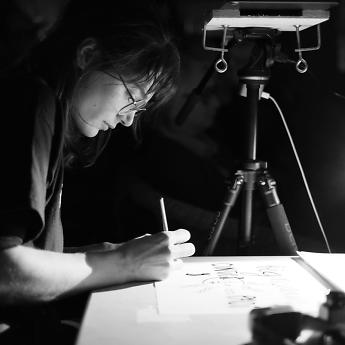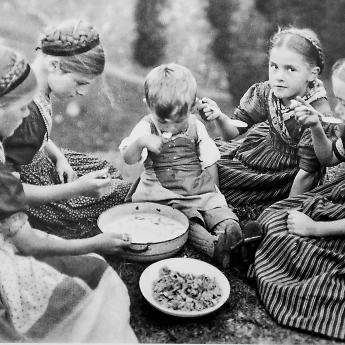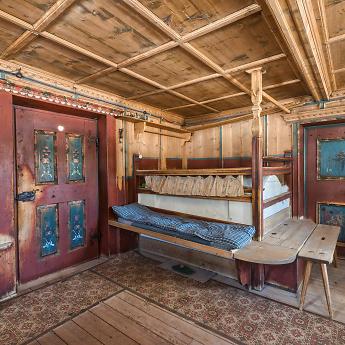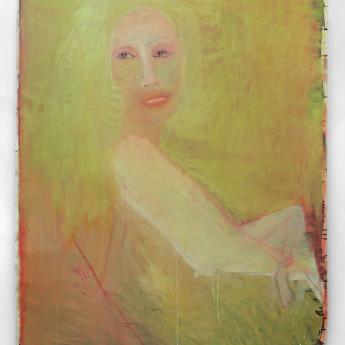
The Ganne and the Silvani
Legends that need to be read
Everywhere the Ladins lived they told stories about the Silvani and the Ganne, wild beings who lived in dens amidst the rocks, where foxes and other animals can sometimes be seen taking shelter. These beings lived on game and dressed in the skins of wolves and bears and wild bulls, which could still be seen then. They had nothing to say; they were as afraid of thunder as of the devil and they mostly suffered from terrible hunger. Up in Collfosco the place was full of these wild beings, who lived scattered around Puz and the mountain meadows; now, it happened that there was a fountain there called Salvan and in the winter these creatures came down from Puz all frozen and stayed mainly in Longiarú and Pezzedi; if you gave them something, they would take it. They did no harm to anyone, but they took savage revenge on anyone who made fun of them or offended them, since they were as strong as giants. They took the greatest pleasure in causing trouble with the sheep, often opening up the sheep pens and letting them out to graze at night. Once in the Valle di Mezzogiorno up in Collfosco there was also a beautiful young Ganna, who always went out of her valley to Pezzedi to get warm: because she went there often she had also learned to speak Ladin. There was a farm owner who was single and who became fond of the Ganna since she was good at her work; after having learned about Christianity, she was baptized, married and became the wife of the owner of Pezzedi. It should be said that she had married him only on condition that he would never hit her on the face with the back of his hand, because in that case she would have had to leave. For a long time everything went well, Ganna was a good and kind wife and raised her children in the fear of God. However, one Saturday, while she was washing her children, her husband arrived, tired out and sat down beside his wife. As she had both hands full with the children, she said "Can you look, I’ve got something on my forehead, I don't know what it is." The poor man put out his hand to chase away or catch the fly or whatever was there, and hit her face with the back of his hand. Immediately she suddenly became very frightened, she went red in the face, let out a sharp cry, and full of emotion she looked at her husband and children and off she went. They never saw her again or had her back.

Also, as is claimed, there were many of these wild animals in the Valley. The men were called Pantegan', the women Panteganne. It is well known that the inhabitants of the Valley always want to have something special. When they came to ask for bread and milk, they said “Puca latta, puca pan”. They said to the people of Miribun that they would never be short of bread and girls, as if by saying this they wanted to show how much they loved them. It seems that the Pantegans were seen less often than the Panteganne and it was only those who worked in the forest who were ever seen. Once a man from the Valley was still working late in the forest and was chopping wood. Suddenly a Pantegan’ came up to him and asked him if he wanted to go home with him. The other man asked him to wait a moment longer, until he had split the log that was in front of him. The Pantegan’ had no objection and asked him what his name was. The other man, who seemed to have been a proper rascal, answered “Myself”. The worker then asked the Pantegan’ to be kind enough to hold open the crack made by the axe in the wood. The poor savage, who didn’t suspect anything, put his hands in the crack, but just at that moment the beast from the Valley pulled out his axe, so that the poor wretch’s hands were trapped in it. He was trapped and began to shout in pain and when his acquaintances who were not far away heard his screams, they ran to him and asked him who had set the trap. “Myself” he replied. “Well, if you did it yourself” said the others “then get yourself out of it.”
Giovanni Battista Alton (1845-1900), born in Colfosco, was an Austro-Hungarian writer known for his studies on the neo-Latin languages of the Dolomite valleys. After graduating in philosophy from Innsbruck in 1870, he taught Latin in various cities of the Austro-Hungarian Empire, including Trento and Vienna. He published several works in Ladin, German and Italian aimed at promulgating the Ladin language by collecting proverbs, stories and popular songs. His best-known work is the volume “Proverbi, tradizioni ed anneddotti delle valli ladine orientali” (1881), from which the legends in these pages are taken. In 1899 he was appointed rector of the Ginnasio di Rovereto but a few months later he was tragically killed in his home.

NOS. The podcast series from Alta Badia Brand addresses all guests who are interested in learning more about us Ladins, our culture and our traditions. Meet us Ladins up close.


Sweatshirts, caps and T-shirts: the Alta Badia Brand collection delivers a unique touch of the Dolomites to the curious, adventure-seeking and nature-loving guest. Every single piece conveys the feeling of being high up in the mountains, even when you're in the city. So cool!









































